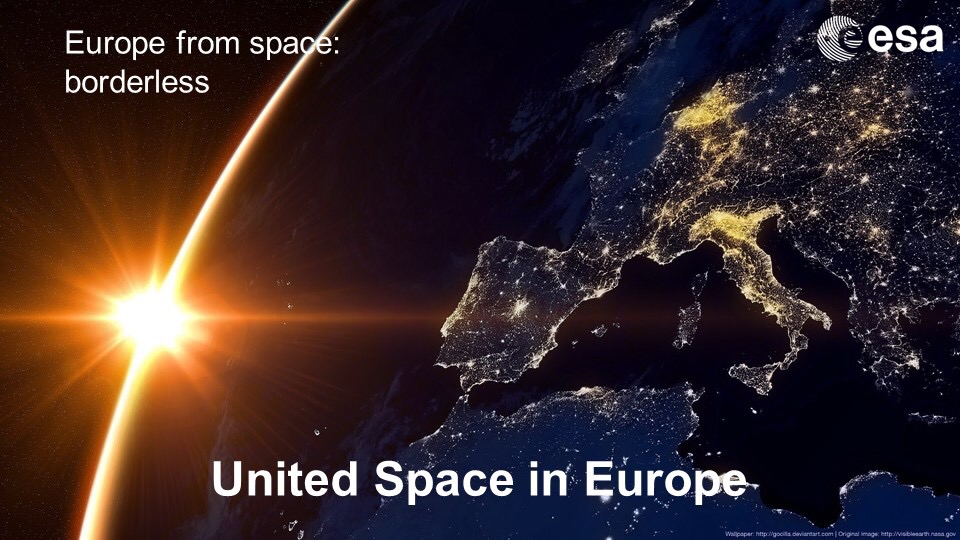It was in the aftermath of World War 2 that the idea of a United Europe first really took hold, resulting in a series of steps being taken that would make it a reality. In parallel to the joint initiatives being pursued by some European states, there were even instances of this paradigm shift being reflected at national level, with the European spirit being given actual legal force, notably in the Basic Law for the Federal Republic of Germany, which says in its preamble: “Inspired by the determination to promote world peace as an equal partner in a united Europe, the German people, in the exercise of their constituent power, have adopted this Basic Law.”
Since then, many steps have been taken with a view to building strong interaction and cooperation in Europe, resulting in the emergence of the present day European Union and all the possibilities and opportunities that entails. In parallel, European organisations like ESA, ESO (the European Southern Observatory) and EUMETSAT (the European Organisation for the Exploitation of Meteorological Satellites) have been set up to reinforce cooperation in various areas. So far so impressive. Does this mean we can just relax and continue as before?
No, clearly the time has come to take stock. What has been achieved? Where are we now? And importantly, what comes next?
 The Brexit referendum would appear to have marked something of a turning point in this development. Although from the very outset I have been a strong advocate against Brexit, I have to acknowledge that the British decision may at least have this positive outcome: it forces us to think about what we can do to strengthen the European idea. In recent years the European Union, the European Commission and similar entities were simply a reality, occasionally subjected to criticism about bureaucracy and distance from the people. In many cases Member States would use European instruments to promote their own national development, while in the Schengen agreement and the introduction of the Euro we can see two very positive examples of European development, now widely taken for granted.
The Brexit referendum would appear to have marked something of a turning point in this development. Although from the very outset I have been a strong advocate against Brexit, I have to acknowledge that the British decision may at least have this positive outcome: it forces us to think about what we can do to strengthen the European idea. In recent years the European Union, the European Commission and similar entities were simply a reality, occasionally subjected to criticism about bureaucracy and distance from the people. In many cases Member States would use European instruments to promote their own national development, while in the Schengen agreement and the introduction of the Euro we can see two very positive examples of European development, now widely taken for granted.
Yet for some time it has been clear there has been a lull in the wind of change in Europe. Some European bodies seized the opportunity to enhance and reinforce their position in various fields; this was the case, for example, with space in the Lisbon Treaty. What began as a positive idea aimed at developing a united Europe has at times resulted in a race for power and influence. Instead of cooperating and making best use of existing competences, parallel structures are under development or have already been developed.
Fortunately enough, ESA, as an intergovernmental organisation of which the UK has decided to remain a member, should not be affected directly. However, even in the ESA context, the occasional problematic impact has become apparent, with some calling for Brexit to be taken into account within ESA. The behaviour on display confirms the pessimistic view that Europe in 2017 is not really ready for a united Europe but instead for a Europe in which everyone is just looking out for their own national or institutional advantage.
None of this is remotely acceptable. The European people deserve a situation in which everyone is focused on acting for one Europe. When astronauts look out and see Europe from above they are unable to see any borders. This should be a clear message to all of us: that we should work for a Europe that transcends vanities and expected short-term advantage. Solidarity must be our starting point, especially in difficult times. As for me, I am fully committed to moving forward with any positive initiatives including those that minimise any negative impact that might result from the Brexit decision.

Discussion: 3 comments
No brexit. xx Only positivity as you say.
Jan, I have read this blog before. However, after meeting you in IAF 2017, I realised that you are a true positive person.
Europeans deserve proves through unity. And UK will realise it very soon, when the space business grows exponentially in the coming years
“[…]with some calling for Brexit to be taken into account within ESA”
This idea is a problem for what ESA represents : a futur where mankind reach space regardless their countries through international cooperation.
Europe is the idea that in the futur, the humanity can be united with bonds stronger than just the current economic relation.